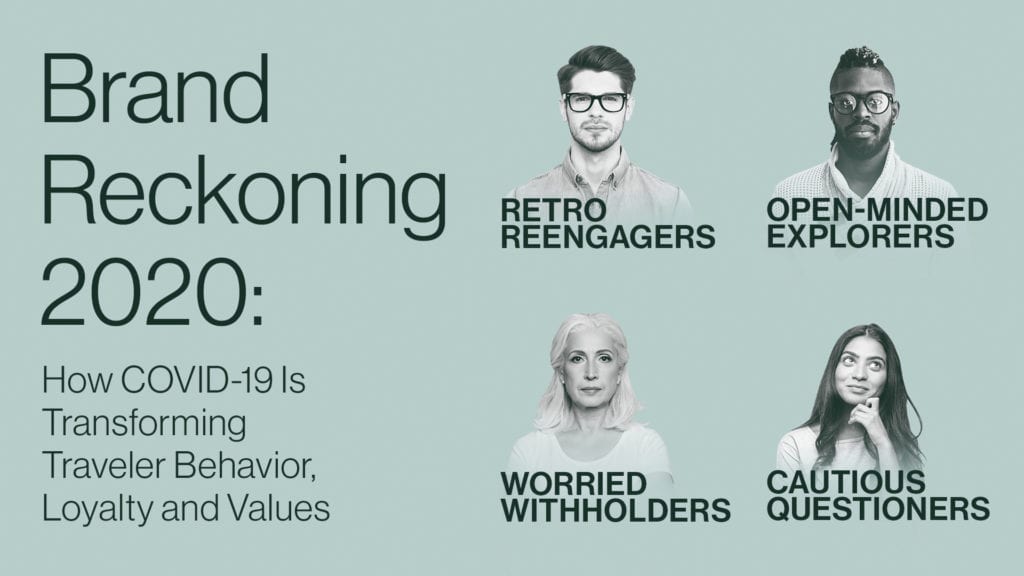Professionals in Travel and Tourism understand the obsession with breaking down how traveler behavior, loyalty and values are being redefined by crisis culture—the uncertainty of health risks, economic downturn and restrictions in day-to-day living caused by COVID-19 and intensified by flashpoint events highlighting systemic racism. For this reason, Ketchum Travel recently surveyed close to 4,000 Americans to understand the patterns in how travelers are reacting, reengaging with the world and redefining their values when it comes to traveling during this period of nonstop disruption.

The truth is—and we have heard it many times—travel will never be the same. So, in the Transforming Travelers study, part of Ketchum’s new research series that includes Brand Reckoning 2020 and Work Shift 2020, we dug deeper and asked some uncomfortable questions to gauge what travelers are truly feeling, thinking and planning. It’s not surprising that nearly all (93%) surveyed have seen COVID-19 impact their travel decisions: where they will travel, what hotels and airlines they will choose and the businesses/people they use to plan, etc. The following topics are where it gets interesting.
It’s Not You, It’s Me. Wait, It’s You.
Three in four Americans (76%) expect to travel more in the next year after not being able to travel now; at the same time, the majority (80%) say they are willing to pay more for privacy and distancing, with cleanliness protocols, naturally, as a big deciding factor. But most of those surveyed (87%) find that fellow travelers, not travel companies, have a bigger impact on whether they feel comfortable traveling. In other words, we do not trust each other to follow COVID-19 safety guidelines.
We’ve Become a Little Judgey.
COVID-19 shaming seems to be reaching new heights these days. For some, this could be a breath of fresh air—who really misses seeing 65 photos from your neighbor’s vacation? But in the COVID era, just as technology allows us to share photos in an instant, we’ve gotten used to not seeing vacation pics cross our feeds daily. And when we do, sometimes we judge. In fact, two-thirds (67%) of those surveyed expect to judge others for traveling before they themselves think it is safe. And half expect to censor their social media posts to avoid being “travel shamed” by those who are more cautious. This may very well be due to the fact that the majority (69%) say they judge others when they disobey safety restrictions.
Familiar Faces Might Be the Key.
More than half (57%) of those surveyed share that COVID-19 has made traveling with close friends more likely. Two-thirds (64%) of parents say COVID-19 has made traveling with their children more likely. And, nearly two-thirds (63%) of parents of adult children (age 18+) say COVID-19 has made traveling together more likely. Maybe a rare silver lining amid in this pandemic is that it’s bringing families closer together.
Work Travel Can Be a Mixed Bag.
The majority (88%) agree that virtual meetings have proven most business travel to be unnecessary. Yet, while many Americans (68%) say they are now less interested in travel for work, the remainder (32%) say they are now more interested than ever in work travel. A change of scene for one-third of the working population could be key to long-term workplace happiness and engagement, which we know is critical for mental health.
Introducing Ketchum’s Transforming Traveler Personas
All that said, with proper understanding of the nuances within these sentiments—pivoting marketing and communications to properly target consumers can be a smooth process. And knowing the type of travelers that now exist can help destinations and travel brands break through the sea of sameness to reach their targets with the right solutions, message and tone.
 We’ve aligned the evolutions in consumer behavior that our research uncovered to specific personas. The four personas are based on whether respondents fall above or below average on two metrics:
We’ve aligned the evolutions in consumer behavior that our research uncovered to specific personas. The four personas are based on whether respondents fall above or below average on two metrics:
- Openness to Reengage: How soon they will feel comfortable returning to their pre-COVID lives and activities. The further along on the axis, the less time it will take before those personas feel comfortable returning to the pre-COVID normal.
- Redefinition of Values: How much the importance of various personal values has changed in response to COVID-19 (e.g., “my physical health,” “feeling connected to my friends,” “cleanliness”). The further along on the axis, the more values have changed (and the greater the magnitude of change).
Implications for Destinations and Travel Brands
What is unique about this research is that we have uncovered patterns that form personas—types of people that all of us can identify with, whether we recognize ourselves or someone we know. While in typical research there are generalizations based on averages in areas like income, age, etc., our analysis looks at more subtle motivations and beliefs, proving that you can’t look at a 30-year-old minority female or a 60-year-old white male through just that demographic lens. She and he could be any one of these four personas. Therefore, if you’re a destination or travel brand, don’t just follow the tried and true target segmentation practices you’ve always used: COVID-19 has certainly evolved how we’re reengaging and what we value as individuals.
In addition, consider how the fundamental notion of travel and what it symbolizes is being redefined by this crisis. It’s a paradox: After months of sheltering in place and distancing ourselves from others, the activity that we normally associate with escapism and relaxation and community now seems fraught with heightened concern. Cleanliness measures will have more weight than anything else. Privacy and distancing may be the new face of luxury travel. Wellness and outdoor recreation will intersect like never before. Imagining our future travel self evolves daily.
Understanding the redefinition of travel and the Transforming Travelers is foundational as destinations and travel brands identify the right approaches to effective and responsible communications practices. And the above is just a glimpse of key takeaways. Ketchum Travel has deeper persona insights on important changes in traveler behavior, loyalty and values.
Ketchum Travel is a boutique within the walls of Ketchum. We see our work through a lens rooted in empathy + intelligence. And all that we do is backed by data and research – conducted by our internal Ketchum Analytics team, who recently brought home 11 wins from the International Association for the Measurement and Evaluation of Communication Awards, including the Platinum Grand Prix Award for the Most Effective Media Intelligence, Research & Insights Company.
If you’re interested in receiving more findings from this study or sitting down (virtually!) to discuss how this can be applied to your efforts—reach out. Also, don’t forget to check out our Ketchum Travel Rebound Roadmap. Responsible communication is a powerful vehicle that you should not be afraid to activate now, no matter where on the road to rebound you are.



